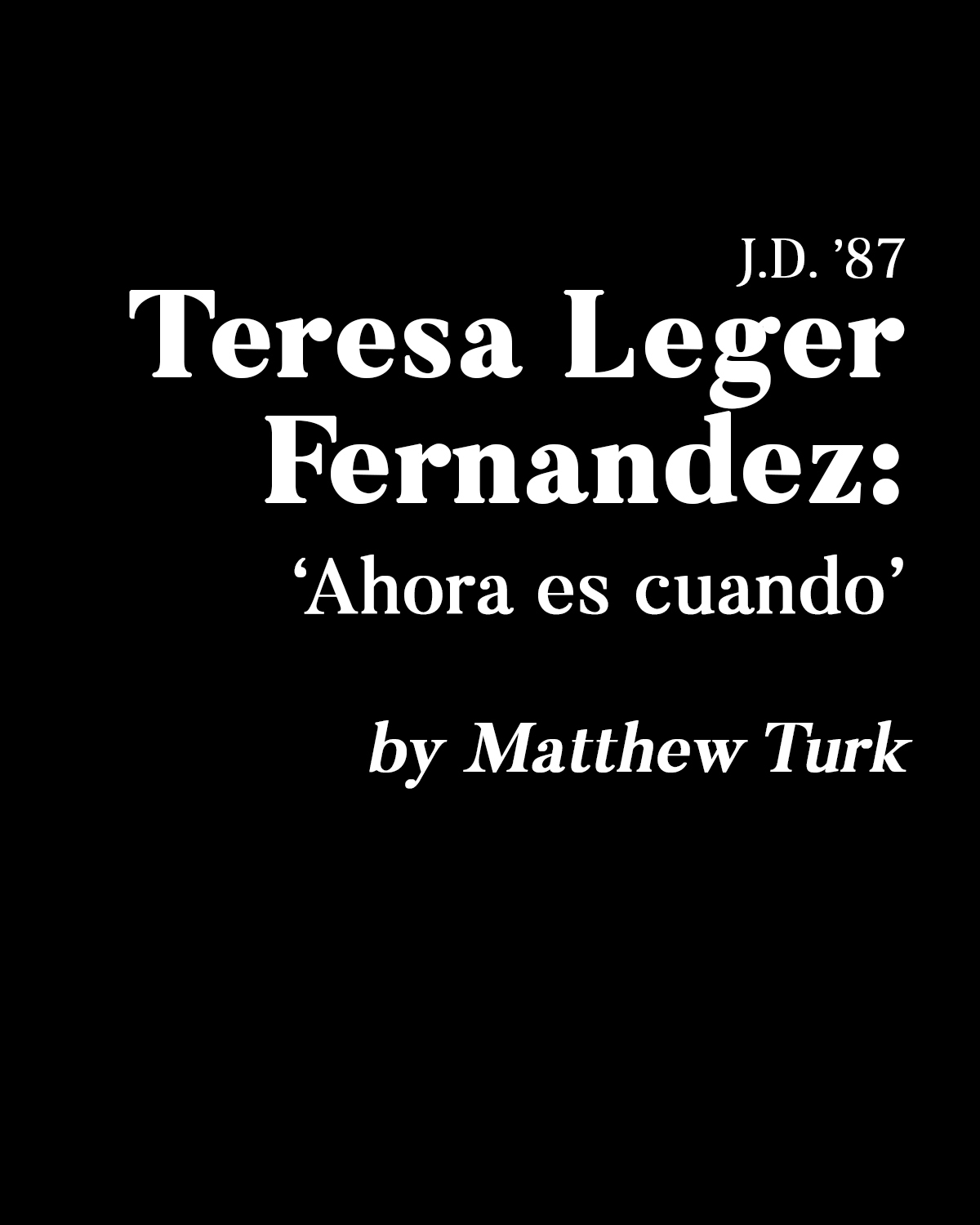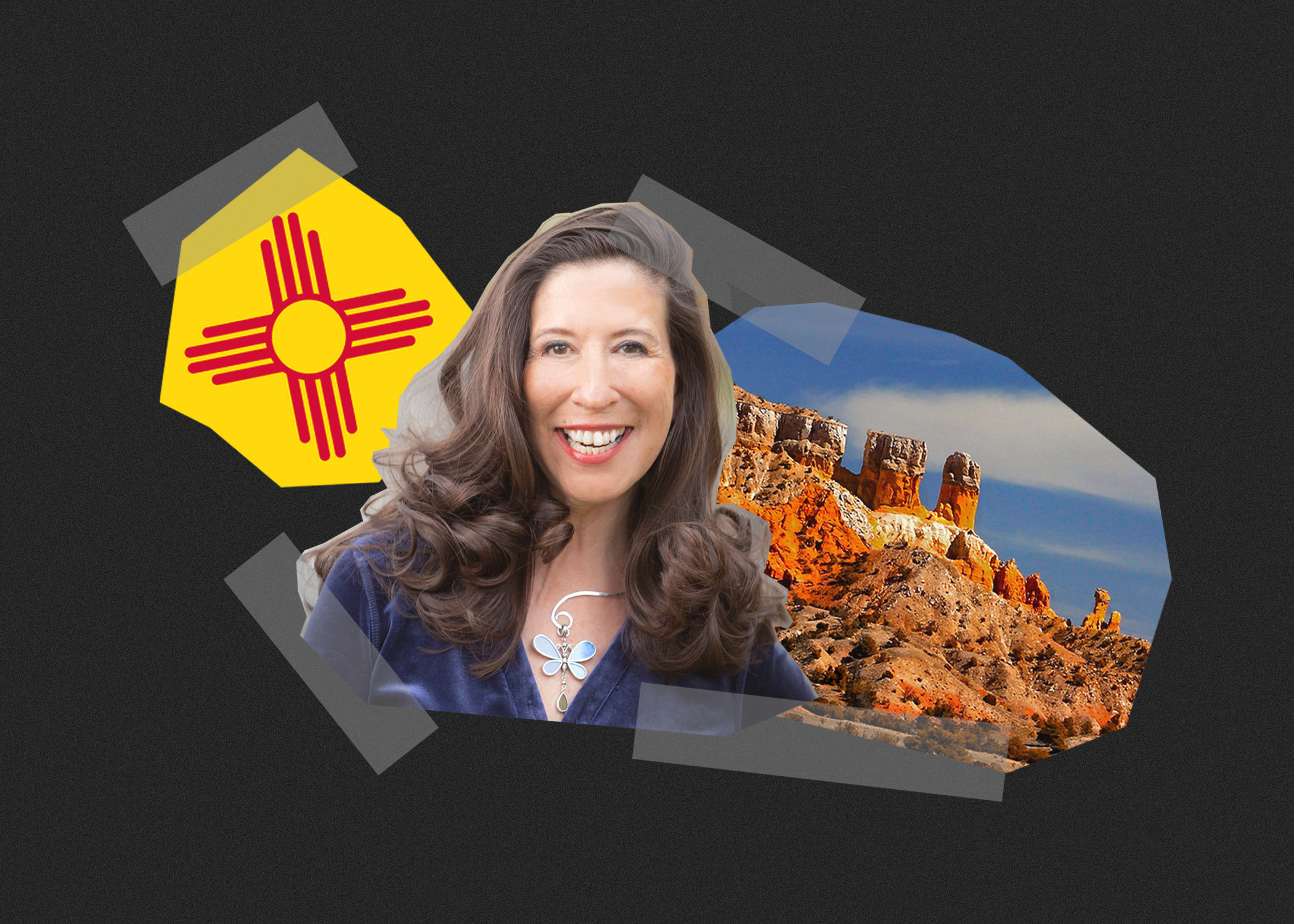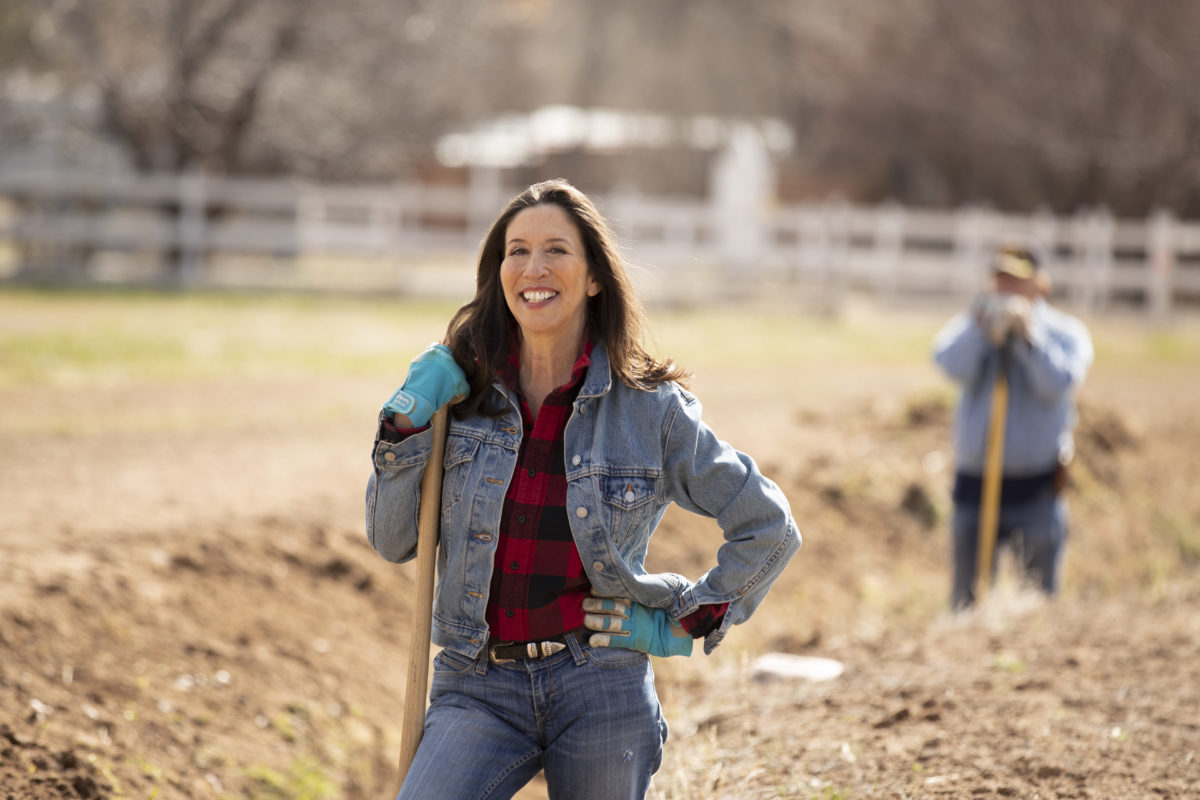

This article is part of a series of profiles of Stanford alumni in politics. Click here to read the rest of the stories.
Election Day was a time buzzing with energy and symbolism for Democratic Rep.-elect Teresa Leger Fernandez J.D. ’87 of New Mexico’s 3rd congressional district. Amid a pandemic that has ravaged communities worldwide, Americans still left their homes on Tuesday, Nov. 3, eager to make their voices heard at the polls. As Leger Fernandez talked to voters in long lines throughout the day, her brother — one of her seven siblings — set up a COVID-19-safe entertainment area with his band and played a version of “Adelitas,” a song about the women who fought in the Mexican Revolution, modified to describe her run for office. “I was honestly surprised by the emotion that overwhelmed me and my family when the race was called,” she said. “I fully realized at that moment the trust the voters placed in me and the awesome responsibility I have to my district and my country.”
America is seeing a historic moment of elevating the voices of women of color, she said, “from the White House to Congress to State Houses — while we also see the deadly impacts of COVID on our communities precisely because they are the most vulnerable.” Many people “know the beauty of Northern New Mexico, Santa Fe and Taos, but to truly represent my district you need to know not only its beauty, but also its poverty — and opportunity.”
New Mexico has a rich history of celebrating its cultural and racial diversity, according to Leger Fernandez. “The first Latina to ever run for Congress was the suffragist Adelina Otero-Warren, and 100 years later, I am the first woman and Latina to represent this district,” she said. “Women, and women of color, deserve to be in all the places where decisions are made that impact our communities — we need to be in all the rooms where it happens.”
An advocate for solar energy and environmentalism, Leger Fernandez runs the Santa Fe-based social impact firm Leger Law and Strategy, where she has worked for 30 years as counsel for Indigenous nations and their businesses. Leger Fernandez is also a community leader on affordable housing and civil rights. Bill Clinton appointed her to be a White House Fellow in 1995. Subsequently, she was appointed to serve as vice chair to the Advisory Council on Historic Preservation under President Barack Obama.
Through a life that began with attending Head Start as a little girl in Las Vegas, New Mexico, to an educational and professional career of true achievement in community involvement, Leger Fernandez joins an all women of color House delegation for New Mexico and now looks to extend a record of social justice victories for voting rights, reproductive freedom and sustainability.

Leger Fernandez originally announced her candidacy after incumbent Rep. Ben Ray Luján announced that he would be seeking New Mexico’s open Senate seat and would not run for reelection to the House in 2020. When deciding to run, she says she happened to come across her father’s memorial ceremony program sheet. It read “Ahora es cuando”: the time is now. The slogan was her father’s “calling cry,” she said, and then it became hers. “It’s time now to take this courageous action to address these issues.”
After advancing from the Democratic primary on June 2 with 43% of the vote, she was heavily favored to win the general election. The district had only elected one GOP candidate in the past 40 years, and on Nov. 3, she was declared the victor. According to the Federal Elections Commission, Leger Fernandez raised more than $2 million, more than 10 times the amount of money that her GOP opponent raised. She was also “very lucky” to be supported by many New Mexico artists who created hand-painted signs, including one in her home office that reads “Ahora es cuando.” According to Leger Fernandez, one in 10 employees in New Mexico are involved in the “creative economy”: artists, musicians, writers, performers and filmmakers. Through art in the present moment, “we start understanding each other, and can come into the racial multicultural healing,” she said. “That needs to happen.”
“Everybody, I think, got excited around a message that put at the center an idea that we needed to protect what we love, because what we loved was under attack,” she said, adding that she sees healthcare, women’s rights and the environment as in danger. “Anytime you love something and it’s in pain, you can do everything you can to help it right, and right now our country is in such pain.”
In Congress, Leger Fernandez said, her experience working in the community means that she understands the issues “from the ground up.” There is no single problem facing New Mexicans, she said: “Everything is all interconnected.” The COVID-19 pandemic has underscored this point. A large population of those affected most in her district, for example, are Hispanos (people of Spanish descent whose lineage in the Southwest dates past the region’s incorporation into the U.S.) or part of the Indigenous community. Environmental conditions such as proximity to coal mines weaken the lungs, and many of these same people do not have access to adequate healthcare. “I know how hard it is to address these issues,” Leger Fernandez said. “So, therefore, when I go to Congress, I’ll have a sense of how to adjust them not from a theoretical basis, but from an actually lived basis.”
On her first day in office, Leger Fernandez plans to start with a recovery bill. “An important thing to do to come out of an economic recession or a depression is to actually have the federal government infuse money into the economy,” she said, “so that you create jobs.” Not only does she want to continue stimulus checks (similar to the CARES Act earlier this year), but she also wants to ensure that the underlying issues that caused the problems are addressed, investing in digital infrastructure, renewable energy and health, always staying true to her worldview and initial motivations, a substantial portion of which was affected greatly by her time at Stanford Law School.
(Responses have been edited for length and clarity.)
We were really involved in running the East Palo Alto Community Law Project, which was started by students and run by students, and I was one of the co-chairs. So one of my favorite memories is, we would meet in one of the basement rooms as the East Palo Alto Community Law Project Steering Committee, and I just loved all of us, crammed into this room, really making decisions. It was the best of both worlds because we were helping other people by providing law services to a low-income minority community that was literally across the railroad tracks from this very wealthy community, but we were also creating friendships among each other that have lasted to this day and doing something that was really good for us as students because it ended up being a great way for us to learn the laws. So it’s this wonderful moment. It’s that memory of riding my bike really early in the morning, with my atole, which is a very New Mexico traditional cornmeal drink that you drink for breakfast. And even though we weren’t in the physical beauty of Stanford — we were in this basement — we were doing good stuff.
There is really no single problem. Everything is all interconnected. And so, COVID has made all of our failures in our society more evident. The pandemic has highlighted and illustrated for all to see the work that we need to do. For example, in New Mexico, some of our hardest hit groups are Native Americans and Hispanos, and that’s because they haven’t had good access to health care. Some of them don’t have running water. They don’t have broadband. Their underlying health conditions are worse. COVID is simply illustrating to us the work that needs to be done, which is all interconnected. If you don’t have access to good health, you probably also don’t have a great job, which means you might not have access to insurance. If you are living under the shadow of a coal mine, your lungs are weakened, so you’re more susceptible to COVID. Everything is interconnected, and what COVID has done is shone a bright light, and it now becomes so much more obvious to everybody in the United States. And those are the kinds of things that New Mexico cares about: its climate, its health, its jobs. But it’s all now wrapped up around the issue of needing to respond to the COVID pandemic.
What I’ve always thought is, you have to do whatever you’re doing with true passion, true commitment. People always say, “Follow your passion.” Well, not everyone knows exactly what they want to do. I don’t know that I’ve always known what my passion is, but I’ve always had the fortune of being able to do whatever I’ve done passionately. Whatever you happen to be doing, do it with complete immersion in what you’re doing and why you’re doing it. That way, whenever you decide to run, you will have learned a lot about yourself and whatever you worked on. And you know that, whatever you did then, you did right. Do things for now — not solely for a later goal, but really doing them for the present so that you can completely immerse yourself in what you’re working on now, and that’s how you end up building a wonderful record of what you believe in. I didn’t really intend to run for office right now, but then you are able to answer the call if it comes. Sometimes it’s not something you planned all your life and that’s also good. But sometimes it’s just like this time. It really was a calling, and I responded to the “Ahora es cuando.”
“Stanford is where I learned to be a rebellious lawyer — a lawyer who listens,” Leger Fernandez said. “I’ve spent decades listening to the communities here and creating opportunity, whether by building businesses in distressed communities, or rural health clinics that provide affordable, accessible healthcare in a culturally relevant manner.”
One of her favorite memories as a student, she recalled, is the memory of riding her bicycle early in the morning with some atole, a traditional cornmeal breakfast drink popular in New Mexico, on her way to the basement of the East Palo Alto Community Law Project’s building. In 1986, Stanford Lawyer Magazine described the East Palo Alto Community Law Project as “something remarkable.” At that point, a third of the student body in the Stanford Law School had gotten involved in activities ranging from pro se clinics and community education programs to project administration and fundraising. “The East Palo Alto Law Project proved to me that it is possible to create opportunities in a place of poverty,” Leger Fernandez said. “I also took graduate classes at Stanford and spent a semester in Peru, studying how a law project for women didn’t limit itself to just addressing legal issues, but addressed all the interrelated problems and needs facing women in poor communities.”
“My legal work, which ranges from voting rights to financing to protecting sacred sites, has continued that theme of looking holistically at what a community might need,” she said. “It was the best of both worlds because we were helping other people by providing law services to a low-income minority community … But we were also creating friendships among each other that have lasted to this day.”
Reflecting on her years and important lessons for those who go into public service, Leger Fernandez said, “Do things for now — not solely for a later goal, but really doing them for the present so that you can completely immerse yourself in what you’re working on now, and that’s how you end up building a wonderful record of what you believe in.” In fact, she said, “I didn’t really intend to run for office right now — it became open — but then you are able to answer the call if it comes. Sometimes it’s a call. Sometimes it’s not something you planned all your life and that’s also good. But sometimes it’s just like this time, it really was a calling, and I responded to the ‘Ahora es cuando.’”
Contact Matthew Turk at mjturk ‘at’ stanford.edu.
